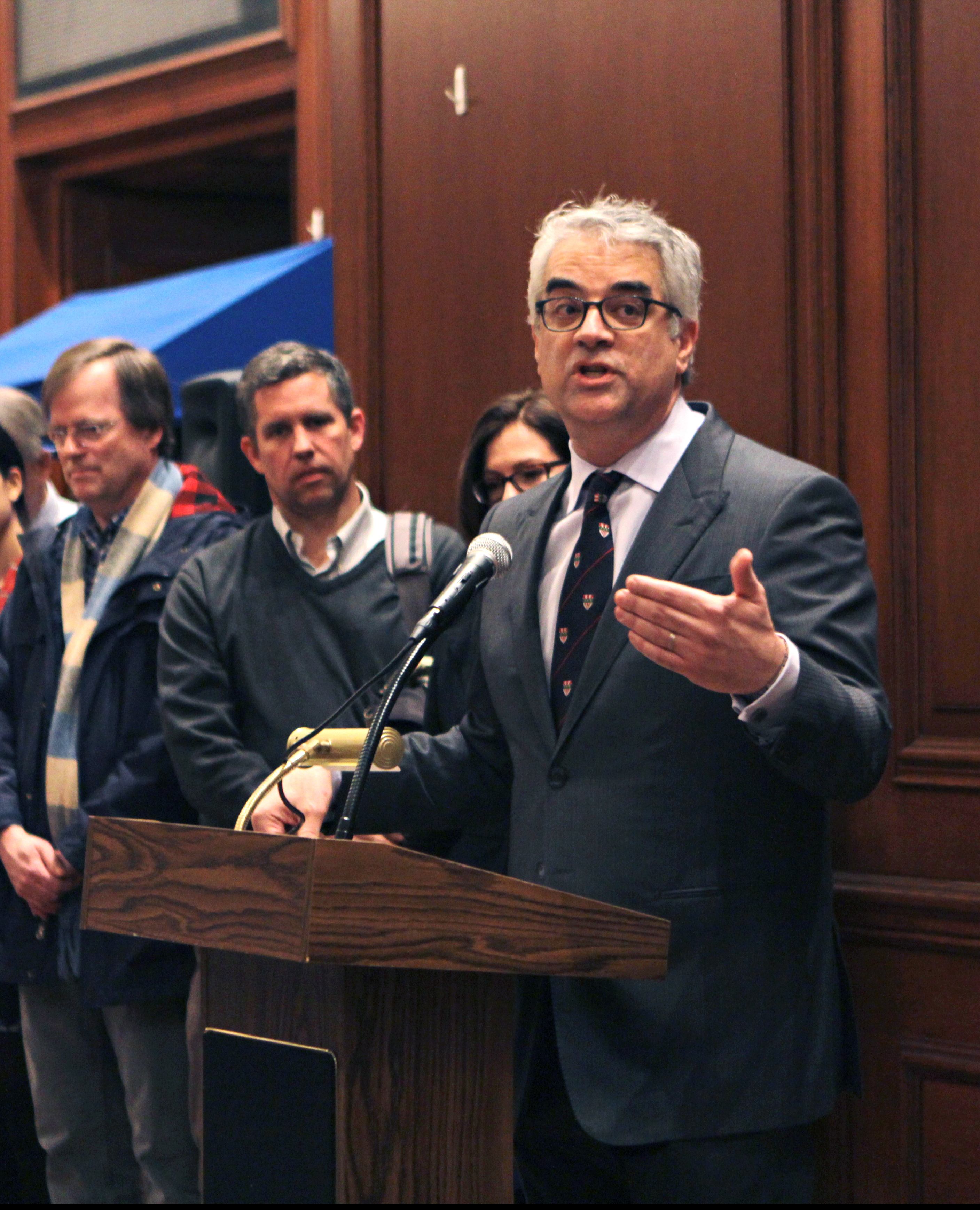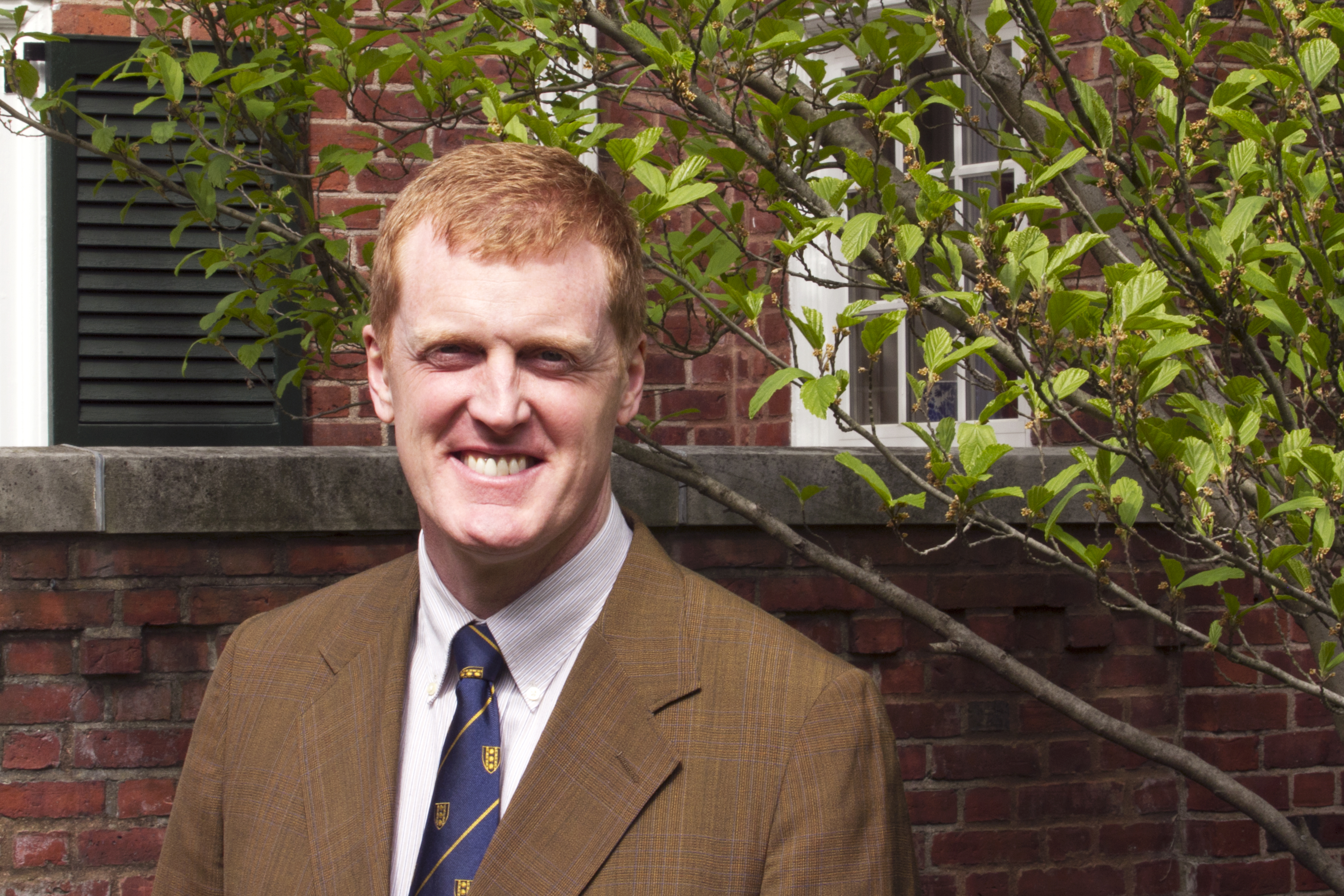
Cries and shouts echoed throughout the usually calm Silliman College courtyard as more than 100 students engaged in a public confrontation with Silliman College Master Nicholas Christakis on Thursday.
Many saw this heated gathering as yet another symptom of a deteriorating residential college community within Silliman. The clash was sparked by an email sent over the Halloween weekend by Associate Master Erika Christakis pushing back against the Intercultural Affairs Council’s discouragement of culturally appropriative Halloween costumes. In several Silliman community meetings last week, students voiced concerns about their own well-being and safety within the college. Most of all, they spoke out about the divisive role the Christakises have played in the Silliman community. Some said Nicholas Christakis has not engaged with Silliman students since becoming master this year, while others said the associate master had “no right” to send an email that would make certain community members feel uncomfortable.
However, Christakis told the News that the master is responsible for serving the intellectual and moral needs of students and argued that his wife’s email did just that. Instead of viewing the confrontations and discussions as symptoms of fractures in the community, he said they were positive learning experiences for everyone.
Still, Alois Cerbu ’18 said students grew upset when the Christakises resisted recognizing that the email had hurt members of the Silliman community.
“Fundamentally, what hurt students in Silliman was that the Christakises’ response did not initially acknowledge students’ pain,” he said.
The disparate reactions expressed by some students and Christakis in light of the past week’s events suggest their disagreement reaches far beyond just the content of the specific email. Instead, it stems from different understandings of the role a residential college master should play.
The official description of a residential college mastership on the Yale College website provides a sweeping generalization of the position.
“The master is the chief administrative officer and the presiding faculty presence in each residential college,” the description reads. “He or she is responsible for the physical well-being and safety of students in the residential college, as well as for fostering and shaping the social, cultural and educational life and character of the college.”
Yale College Dean Jonathan Holloway, who previously served as master of Calhoun College, said the master’s role was designed to allow individual masters to be independent actors in Yale’s larger administrative framework.
“Masters are tasked with taking care of their students, but the point is to let them wander and explore,” Holloway said.
He added that masters are tasked with building a community — a broad directive in contrast to the residential college deans, who must adhere to undergraduate academic regulations.
University President Peter Salovey said individuals can approach the role of master in unique ways.
“Being a master has both an institutional role but is also an individual’s personal take on how they want to carry out that role,” Salovey said. “It is not a cookie-cutter position. I think the position has a lot of room for each master to bring his or her talent, areas of interest and personality.”
But beyond general areas of responsibility, an underlying tension in the role has come to light in the wake of recent events within the Silliman community. What happens when students perceive that a master’s attempt to shape the intellectual culture of the community clashes with his or her responsibility to create a safe and welcoming environment for students?
WHAT HAPPENED IN SILLIMAN?
In defending his wife’s email to the News, Christakis reiterated his vision for his role and for the Silliman community. Christakis said that when he met with Salovey last spring before becoming a master, they discussed a role that would foster intellectual and moral discussion in the community. He added that he believes colleges are intimate and personal communities where students can be themselves but also engage in intellectual debate. Erika Christakis’ Halloween email, part of which asked students to engage with one another if they encounter costumes they find offensive, is an extension of that vision, he said.
However, as a result of Erika Christakis’ original email and the couple’s handling of student reactions since, some Silliman students said they feel unsafe and cannot sleep in their own rooms. Many have called for Christakis’ removal as master because he cannot create a healthy community within the college.
Students said Christakis has not made enough of an effort to integrate himself into the Silliman community. For example, he does not have an office in the college and has not held any events for Silliman seniors. Students also said Christakis does not know many students’ names — a sign that he is disconnected from the college.
Holloway said the balance between making the college a safe space for students and a place for intellectual stimulation is a “tough one.”
“Christakis has a real vision of a residential college as a place for intense intellectual engagement and that’s great,” Holloway said. “But there needs to be trust first.”
Holloway said Christakis, like any new master, needs to build a rapport with students before raising potentially sensitive new discussions. In order to implement the “lovely philosophy” of setting the college’s intellectual and moral tone, masters have to build trust in the community through day-to-day activities and interactions, Holloway said.
Christakis said he does not think there is a conflict between tending to the daily needs of students and generating intellectual discussions. When asked how he would respond to students who do not see Silliman as a home anymore, Christakis said, “You should go talk to those students then.”
Zach Young ’17, a Silliman College student, said it is clear to him that masters should have intellectual roles in their colleges, as they are often among the most distinguished professors at Yale. He added that he finds the idea of a master being asked to either apologize or resign for stating his or her opinion disturbing and antithetical to the spirit of a university.
MASTERS’ ROLE AND VOICE
Erika Christakis’ Halloween email, which made clear her stance on censuring potentially offensive costumes, also raised the question of individual college masters’ autonomy in taking political and social stances.
In mid-August, Stephen Davis — the head of Pierson College and chair of the Council of Masters — made a controversial decision independent of the other college heads, asking his students to no longer refer to him as “master.”
“I think there should be no context in our society or in our university in which an African-American student, professor or staff member — or any person, for that matter — should be asked to call anyone ‘master,’” Davis wrote in an email to the Pierson community. “And there should be no context where male-gendered titles should be normalized as markers of authority.”
Although the Council of Masters had been planning to discuss the title at the start of the semester, Davis chose to proceed unilaterally.
Though he emphasized that he was speaking generally and without reference to Davis, Salovey said he believes it is best for the Council of Masters to enact policy changes rather than individual college masters.
“I think issues of policy or implementation of Yale College policy or the creation of new policy where there isn’t guidelines are most effectively discussed by the Council of Masters as a whole rather than individual masters deciding on policies individually,” he said.
Sam Chauncey ’57, who served as University Secretary in the 1960s and 1970s, said masters have become much more involved in the lives of their students over the past 60 years, even sometimes filling a parental role. As a result, it has become more difficult for them to express their opinions, he said.
“On the one hand, the master has become more parental, and secondly, there seems to be a feeling that the master’s job is to support you in your expressions of your opinions, but seems to not allow them to have the same opportunity,” Chauncey said.
Chauncey added that as parental figures, masters who exercise their right to free speech must do so respectfully.
History professor Jay Gitlin ’71 MUS ’74 GRD ’02 said the primary responsibility of masters has always been to foster a sense of community, but fulfilling that responsibility has grown more difficult over time.
“Masters maintain a community and a culture and an identity, so in some sense they are professors but also local parents,” he said. “But it’s become more of a challenge to help maintain community and be inclusive because we aren’t as neatly social as we once were — people feel more isolated. It’s harder for everyone to feel included, but that’s still the goal and it needs to be the goal.”








